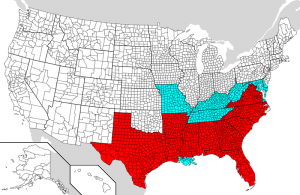(ThyBlackMan.com) On June 19, 1865, the last of the enslaved people of African descent got the word that President Lincoln had freed the slaves and the Civil War had ended. On this day in 1865, Union General Gordon Granger rode intoGalveston,Tex., and informed the local population that the Civil War was over and that the estimated 250,000 slaves in the region were free. This announcement came two and half years after Abraham Lincoln signed the Emancipation Proclamation.
There is a lot of confusion and disinformation when it comes to Lincoln and the Emancipation Proclamation. Lincoln has been portrayed in history as the President who ended slavery but few people realize that he only emancipated the slaves who were in confederate states after those states refused to return to the union. It would be after the civil war that slavery was ended by the 13th Amendment of the United States Constitution. If the states in  rebellion had decided to rejoin the union, who knows how long chattel slavery in the South would have lasted.
rebellion had decided to rejoin the union, who knows how long chattel slavery in the South would have lasted.
The Emancipation Proclamation
The Emancipation Proclamation was an Executive Order issued by President Lincoln on January 1, 1863 that contrary to popular belief, did not free all the people held in slavery. In fact, his motivation for issuing the proclamation had nothing to do with some moral sense to abolish slavery. In 1862, a preliminary proclamation but was issued as a threat to the confederate states that their slaves would be freed unless they rejoined the union byJanuary 1, 1863. No confederate state rejoined the union.
Once Lincoln issued the Emancipation Proclamation, it did not apply to those areas already under Union control.
As the illustration above shows, the areas in red were slave holding states and counties affected by the Emancipation Proclamation. Areas permitted to keep their slaves are in blue.
Congress only outlawed slavery in 1865 after the civil war ended. However, the 13th amendment, which abolished slavery, really did not end the institution. It left slavery in place as punishment for crime.
Section 1. Neither slavery nor involuntary servitude, except as a punishment for crime whereof the party shall have been duly convicted, shall exist within the United States, or any place subject to their jurisdiction
When you look at the provision for slavery in the Constitution and then consider that millions of people in the United State are put to work and paid pennies on the hour for their labor, then it would be incorrect to state that the United States abolished slavery. It merely transferred the institution of slavery into the hands of the state, which then hires them out to corporations and farms as cheap labor. If you look at the increasing transfer of the operation of state prisons into private hands, then we come full circle and know individuals can legally own human beings for the sole purpose of turning a profit.
When the vast majority of those held on prison plantations of African descent and being held in bondage due to violating ridiculous drug laws that are of a non-violent nature, it would seem another Emancipation Proclamation is long over due. There should be no doubt that like Lincoln; the President of the United Statesh as the power by executive order to release every single one of these 21st century slaves. To this date, only one Presidential candidate has ever pledged to free these slaves but Congressman Ron Paul of Texas, will never be president so those interested in finally ending slavery in America have a long road ahead.
Staff Writer; Scotty Reid
To join this brother Black Talk Radio Movement feel free to visit; BT Radio Network.
Also connect via Facebook; Black Talk Fan Page.

















Leave a Reply